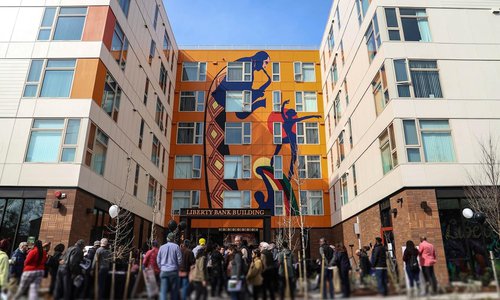Community ownership
The Power and Promise of TLGBQIA+-owned Spaces
This report from the LISC Community Research and Impact team explores LGBTQIA+ capital access, community ownership as a strategy for building queer and trans community and economic power, and the financing and organizing resources needed to expand this work.
The Racial Justice Implications of TOPA: Seizing Preservation Opportunities
A new research brief from LISC Community Research and Impact empirically examines the potential racial equity benefits of COPA (Community Opportunity to Purchase Act) and TOPA (Tenant Opportunity to Purchase Act) policies and housing preservation strategies.
Spotlight on Resident Voice and Community Ownership
Community development, at its core, helps residents create their own shared future. This concept of self-determination – also known as community ownership – is fundamental to LISC’s work, as we recognize that both our own investments and others from the public and private sector need to be directed by local voices. This Spotlight for the Institute for Community Power highlights contemporary efforts to advance community ownership by bringing residents together to elevate their voices and decision-making abilities. In it, we look at three programs designed and implemented by LISC and local partners: Training for Trainers (T4T) in Houston; the Newark Resident Leadership Academy (NRLA); and Community Connectors in Philadelphia.
Announcing the New Creative Placemaking Technical Assistance Website
The newly launched Creative Placemaking Technical Assistance website celebrates the power of arts and culture in strengthening communities, and offers an abundance of resources for anyone working in creative placemaking or curious about it! Explore the tools and insights initially developed by LISC and our partners, and updated by the National Endowment for the Arts’ Creative Placemaking Technical Assistance team and our many partners. Whether you’re looking to enhance engagement with residents and artists, navigate partnership dynamics, or plan cross-sector initiatives, we invite you to check out our site and join our community dedicated to community development and planning through arts, culture, and creativity!
Stable Homes and Resident Empowerment
This report from the LISC Community Research and Impact team describes COPA and TOPA policies at work and their outcomes in DC and San Francisco, implementation lessons, and evidence about the impact of these policies based on preliminary LISC analyses of housing market dynamics in New York City.
Community ownership through real estate: Propelling a movement beyond a moment
The LISC Institute for Community Power, LISC Twin Cities, and Center for Community Land Trust Innovation hosted a conversation with community-owned real estate initiatives in the Twin Cities working to preserve community-serving businesses, build community wealth, and promote community-led economic development with and for BIPOC and immigrant communities.
Tenant & Community Opportunity to Purchase Policies
Implementation lessons and impact prospects for Tenant and Community Opportunity to Purchase Act (TOPA or COPA) policies.
Commercial Community Ownership as a Strategy for Just Development
This LISC report highlights commercial community ownership strategies and shares lessons and recommendations from groups working to preserve affordable space for small businesses and community organizations, build community wealth, and promote community-led economic development.
Pathways to Tenant and Community Control: Financing Strategies for Community Land Trusts
The LISC Institute for Community Power and LISC Bay Area hosted a conversation with Filipino CDC, Oakland Community Land Trust, and San Francisco Community Land Trust for a conversation on how to build power and secure resources to expand tenant and community control of housing.

“Real Power is in the Land”: Community Land Trusts—Past, Present and Future
From their Southern roots in the Civil Rights movement to dynamic new efforts in diverse parts of the country, Community Land Trusts (CLTs) have proved to be a powerful means to combatting Black land loss and displacement, building community wealth, and strengthening community health and wellbeing. A recent LISC-led panel brought together leading CLT proponents to discuss the history of community land ownership in America, the rising movement today, and how CLTs are an imperative tool in the fight for economic, racial and environmental justice and equitable recovery from the pandemic.